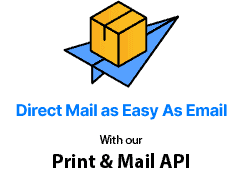Different Types of Direct Mails and Why You Should be Sending Them
Direct mail is one of the oldest yet effective marketing strategies employed by businesses. Despite being a traditional marketing strategy, direct mail has strived throughout the years. Usually, direct mail campaigns are based on specific geographic areas.

The primary reason businesses continue to use direct mail as a marketing channel is their high response rate. Companies now have access to direct mail automation tools like PostGrid. Such tools enable businesses to get rid of manual processes altogether.
Additionally, direct mail also gives you the ability to choose between numerous types of direct mail that fits your unique needs. You must employ different types of direct mail marketing strategies that appeal to your prospects.
So, businesses must be aware of the different types of direct mail and their advantages. Here, we will discuss some of the most effective types of direct mail pieces businesses use.
7 Most Efficient Types of Direct Mails and Their Advantages
By listing the unique characteristics of the different types of direct mail we hope to help you choose the right one for your business.
1. Classic Package
The most used and popular type of direct mail used in Australia is the classic package. As you might have noticed, the classic package is the one that comes in a standard envelope. Usually, this envelope is enclosed with a letter and a response form.
The response form enclosed in the envelope can be a donation form, membership form, or something else. The classic package can also include additional mailpieces, including flyers and brochures.
It is always best to personalise the mail you send through classic packages. You can use an advanced system such as PostGrid to customise all the elements in the mailer. It includes the envelope, the letter within the same, and even the additional mailpiece.
You must align the different elements of the mailpiece with your target audience and their interests. Doing so will significantly boost the direct mail’s response rate.
2. Newsletter
Newsletters are another type of direct mail that is popular among businesses/organisations. However, it is worth noting that the newsletters are ideal for existing members/customers rather than fresh leads.
The newsletters tend to be more effective on existing customers or members. It is because newsletters inform what’s happening inside your organisation. However, there is no need for a potential lead to take an interest in your organisation’s internal matters.
Newsletters usually tend to be longer. They may contain a variety of information, such as the latest achievement of your company or organisation. Similarly, you can also use newsletters to inform the recipient about new missions or targets you’ve set for your organisation.
As the name suggests, newsletters are better used to convey the latest news important to your organisation or company. However, newsletters tend to be more costly than other mailers. Why? Because of their lengthier nature and related printing expenses.
 Also Read: What Is a Good Direct Mail Response Rate?
Also Read: What Is a Good Direct Mail Response Rate?3. Self-Mailer
Unlike classic packages that we are well familiar with, the self-mailers do not come in an envelope. Self-mailers are usually preferred by organisations that want to minimise their direct mail cost. It is because self-mailers are relatively inexpensive.
Self-mailers often come in a single piece of large paper. The large piece of paper is then folded down to an envelope size, making it easy to carry and store. In addition, since it does not need an envelope and contains additional mail pieces, you can save a lot of paper and ink.
The minimised use of paper and ink further leads to a lower cost for the self-mailers. Like classic packages, you need to personalise the newsletter to generate a better response from the recipient. Even if the content does not vary, you still need to address the newsletter with the recipient’s name.
You can accomplish this by integrating the advanced direct mail API such as PostGrid with your CRM. It enables you to personalise your newsletters to each recipient easily. You can find and print names by simply using the data available in your CRM.
4. Postcards
Postcards are without question one of the most cost-effective types of direct mail pieces you can use. Although postcards come in different sizes, businesses usually tend to use smaller ones. The main reason businesses choose to use smaller postcards is that they are relatively cheap to print and mail.
Postcards only need a small amount of paper because of their size and lack of envelopes. As the preferable size of the postcards is small, the printing cost for such mailers is low. The smaller size of postcards also makes it easy to store, transport, and mail.
Another reason why postcards are the most popular choice among types of direct mail advertising is their visual appeal. Postcards can use personalised photos and graphics. Doing so can enable you to better connect with the recipients.
Furthermore, the use of concise messaging enables the reader to read the mailer conveniently. As a result, postcards can intrigue new target audiences to take the desired action. Additionally, it also allows your business to keep your existing customers engaged with your brand.
5. Catalogues
Catalogues are considered one of the best types of direct mail marketing tools. They are especially beneficial for nonprofit organisations. For example, you may use them to get more donations or donors. Similarly, they are also an ideal choice for pitching new products or services to your target audience.
For boosting the response, you may try using print gift catalogues. It can be employed for businesses and nonprofit organisations alike. However, you should ensure that the catalogue conveys the specifics of your organisation, product, or service.
It is worth noting that the printing of catalogues, such as small booklets, can be relatively expensive. This high expense is due to the extra amount of paper required and the initial printing costs.
However, on the bright side, catalogues do allow you to include several images and texts based on your needs. You can use this space for showcasing the details of your products or services. Therefore, catalogues can be the ideal type of direct mail for B2B businesses.
6. Lead Letters
Lead letters are a more traditional form of direct mail. It is less popular as compared to postcards which are used across all industry verticals. But, unlike postcards, lead letters are often considered to be more professional. Hence, it is better suited for B2B businesses.
Lead letters offer a more confidential approach to direct mail marketing. However, you must aim for a highly targeted audience for your lead letters. For example, you can send lead letters to your current customers who appreciate and value the mailer’s finer details.
Due to the highly targeted nature of lead letters, they can be hyper-personalised. Thus, the mailer can fit the requirements of individual customers. Therefore, a well-drafted lead letter will make your direct mail look more sophisticated than ever.
7. Dimensional Mailers
The dimensional mailers can be considered as an upgraded version of brochures and leaflets. They are created specifically for higher level business-to-business contacts. Furthermore, dimensional mailers are ideal for providing a complete overview of your business.
Dimensional mailers allow you to capture the attention of the target audience. After all, getting noticed is half the battle when it comes to marketing. Dimensional mailers use a pop-up or three-dimensional format of mailers.
It means you can use packages such as boxes, tubes, bags, or containers with other shapes for sending your mailer. However, the three-dimensional form of the package also means that it’d be more expensive than regular mail.
That being said, most marketers would consider the extra cost of dimensional mailers money well spent. Why? Because dimensional mailers have a near-perfect open rate. Also, it has the best response rate compared to any other type of direct mail.
Streamline Your Direct Mail Operations With Automation
Regardless of the types of direct mail advertising you use, you still need advanced capabilities like automation. Thankfully, incorporating such features into your direct mail campaigns is easier than you might think.
With robust solutions like PostGrid, you can automate your entire direct mail process. This automation includes personalisation to printing to the delivery of your direct mail. You can even connect your CRM with PostGrid’s system. It will enable easy and streamlined customisation of your mailpieces.
You can use PostGrid’s address verification API to ensure direct mail’s deliverability. The AMAS (Address Matching Approval System) approved system from PostGrid validates the addresses. It is possible by comparing them against Australia Post’s official address database.
Conclusion
Today, there are several types of direct mail marketing that you can use for your unique business. The direct mail strategy you choose must be based on your unique requirements. You must also consider the different types of direct mail and their advantages and disadvantages before you select one.
The different types of direct mail have various characteristic features. Regardless of the types of direct mail advertising, you must always use an advanced direct mail automation tool like PostGrid. Systems like PostGrid can streamline your direct mail process through automation.
Powerful direct mail tools like PostGrid enable you to automate all direct mail manual processes. PostGrid’s AMAS approved API even allows you to validate your address database. Hence, you can streamline your direct mail process and ensure maximum deliverability using a system like PostGrid.
Personalize, print, and deliver different types of direct mail for your business with PostGrid! Ensure the deliverability of your direct mail campaign with PostGrid’s AMAS approved address validation API.
The post Direct Mail Types appeared first on PostGrid.
source https://www.postgrid.com.au/direct-mail-types/



No comments:
Post a Comment